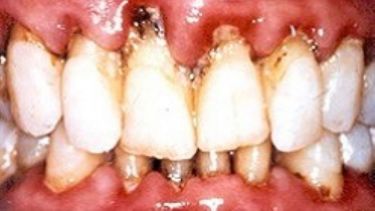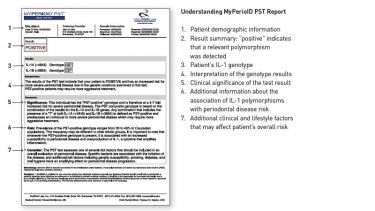Interleukin-1 gene biomarkers revolutionise personalised dental healthcare in the USA
Leading research carried out at the University of ∫˘¬´”∞“µ on how the cytokine, interleukin-1 works in the body was used to justify the introduction of genetic testing by insurance companies for dental healthcare in the USA.

The research led directly to the development of these tests (PST test) and has been implemented by Delta Dental (largest dental insurer in the USA). The test classifies patients in terms of their risk of periodontitis and has informed USA government policy on the use of genetic data in healthcare leading directly to new dental policies for adults based on personalised IL-1 genetic data. The health value of this is $4.8 billion/year in the USA.
Details of the impact:
Through scientific collaboration by the University of ∫˘¬´”∞“µ with Interleukin Genetics, the intellectual property from these discoveries was patented and then translated into commercially available genetic tests marketed in 2007 by Interleukin Genetics (ILG) Inc. in the USA. The periodontal susceptibility test is the first example of an objective leading-edge tool for dentists to manage and prevent the complications of periodontal disease.
Commercial impact from the development of genetic tests to assess susceptibility to periodontitis.
ILG Inc. has produced an ‚Äòat patient kit‚Äô for diagnosis and management of periodontal disease PST¬Æ, based on the ∫˘¬´”∞“µ research, which was a highly significant step in the development of the company and its public flotation [S1,S2]. Originally Medical Science Systems (1998), the company became ILG in 2000 and floated on the NASDAQ stock exchange. The PST¬Æ kit has been retailed at $169 and marketed by Oral DNA Labs, Brentwood, TN; but a new version of the test is available to dentists across the USA only through Interleukin Genetics Inc. and the cost is fully reimbursed by Delta Dental (United States Government Securities and Exchange Commission Filing, 25 February 2013). [text removed for publication].
Impact on insurance policy provision.
Based on the Giannobile et al. [R3] findings and the U.S. government guidance on use of genetic information in compliance with the Genetic Information Non-discrimination Act (GINA), new dental insurance plans incorporate the IL-1 genetic test for people with certain characteristics, including: (a) all adults with no history of periodontitis covered by insurance for 1 annual dental cleaning unless shown to be at high risk for severe periodontitis based on the IL-1 genetic test plus smoking or diabetes; (b) patients with 1 or more of the 3 risk factors will be reimbursed for 2 to 4 cleanings annually, based on number of risk factors; and (c) the IL-1 genetic test is fully reimbursed by insurance.
Of the $108 billion dollars spent on dental care in the U.S. in 2010, approximately 76% of procedures and 50% of costs were attributable to routine examinations and cleanings. Under the above elements of dental insurance plans based on the IL-1 genetic test, dentists are incentivised to use the genetic test in order to identify those patients who need and qualify for insurance coverage of the 2 annual cleanings they currently have, or even more if they have multiple risk factors. Of the 3 risk factors, the most frequent one is the IL-1 genetic test.
Impact arising from driving behaviour change by private dental care companies in the US leading to billion dollar savings in the sales of dental care policies.
During the spring of 2013, ILG Inc. [S1] entered into an agreement with Delta Dental [S4] to take forward the process of refreshing previous, and developing new dental plans, based on the PST® test [S5]. The new policies use a PST® test result as a basis upon which to stratify the number of dental cleanings routinely included in dental insurance plans. All dental providers have received communications regarding this change to policy through the summer of 2013 as it represents a change to standard operating procedure. A low-risk result in the test results in a policy for 1 cleaning/year while a high-risk result (indicating increased susceptibility to periodontitis) leads to a recommendation of 2-4 teeth cleanings/year, depending on the number of risk factors. From this stratification, risk-based models project a $37 saving/patient/year. These relatively modest savings per patient translate into $4.8 billion saved per year for 175 million patients in the US with dental insurance (National Association of Dental Plans, 2011).
Policy impact arising from a US government-endorsed example to insurers of the clinical health value of personalised medicine.
In the US, 42% of individuals have periodontitis (CDC, Atlanta). The PST® test allows stratification of an ‘at risk’ population and this has been recognised by the US government as an example of the appropriate use of personalised genetic tests to allocate preventive care [S6]. This is described in the Federal Register, Department of Health and Health Delivery 25 January 2013 [S7].
Sources to corroborate the impact:
S1. The CEO of Interleukin Genetics can corroborate the utility and sales of the PST® test for periodontitis. .
S2. The NASDAQ stock exchange listing for Interleukin Genetics can corroborate the economic impact of the IL-1 genetic tests.
S3. [text removed for publication].
S4. The Chief Scientific Officer of Delta Dental USA can corroborate dental health, economic and dental plan policy impacts.
S5. The United States Securities and Exchange Commission Filing 001-32715 in 2013 available at confirms the agreement between Renaissance Health Services Corp (owner of Delta Dental in 8 states and 2nd largest Dental Insurer in the US) and Interleukin Genetics to offer the PST test to all individuals with dental insurance.
S6. The Senior Vice President of Cavarocchi Ruscio Dennis Associates can corroborate the impact on public health policy.
S7. The Federal Register (Department of Health and Health Delivery 25 Jan 2013, 78(16), 5666) shows that the PST test formed the basis of a discussion on the US Senate on personalised medicine.
References to the research:
University of ∫˘¬´”∞“µ researchers shown in bold.
R1. Kornman, K.S., Crane, A., Wang, H.Y., di Giovine, F.S., Newman, M.G., Pirk, F.W., Wilson, T.G., Jr., Higginbottom, F.L. and Duff, G.W. (1997) The interleukin-1 genotype as a severity factor in adult periodontal disease. Journal of Clinical Periodontology, 24, 72-77. doi: (Arthritis UK Programme grant to Duff (PI) 1990-1998, £2M)
R2. Kornman, K.S., Pankow, J., Offenbacher, S., Beck, J., di Giovine, F. and Duff, G.W. (1999) Interleukin-1 genotypes and the association between periodontitis and cardiovascular disease. Journal of Periodontal Research, 34, 353-357.
R3. Giannobile W.V., Braun T.M., Caplis A.K., Doucette-Stamm, L., Duff G.W., Kornman K.S. (2013). Patient stratification for Preventive Care in Dentistry. Journal of Dental Research, 92, 694-670. doi:
R4. Cox A, Camp NJ, Cannings C, di Giovine FS, Dale M, Worthington J, John S, Ollier WE, Silman AJ, Duff GW. (1999). Combined sib-TDT and TDT provide evidence for linkage of the IL-1 gene cluster to erosive rheumatoid arthritis. Human Molecular Genetics, 8: 1707-1713. doi:
R5. Chen H, Wilkins LM, Aziz N, Cannings C, Wyllie DH, Bingle C, Rogus J, Beck JD, Offenbacher S, Cork MJ, Rafie-Kolpin M, Hsieh CM, Kornman KS, Duff GW. (2006). Single nucleotide polymorphisms in the human IL-1B gene affect transcription according to haplotype context. Human Molecular Genetics, 15: 519-529. doi:
R6. Rogus J, Beck JD, Offenbacher S, Huttner K, Iacoviello L, Latella MC, de Gaetano M, Wang HY, Kornman KS, Duff GW. (2008). IL-1 beta gene promoter haplotype pairs predict clinical levels of IL-1B and C-reactive protein. Human Genetics, 123: 387-398. doi:


